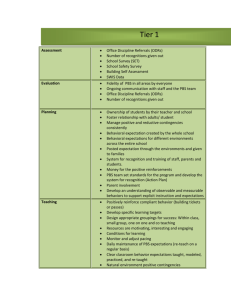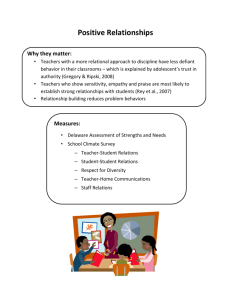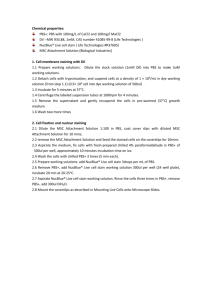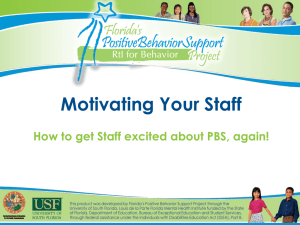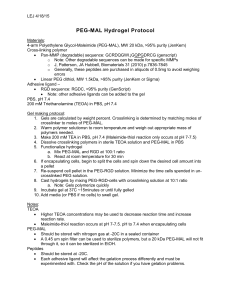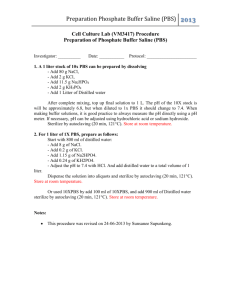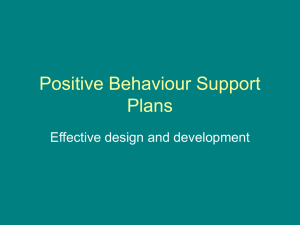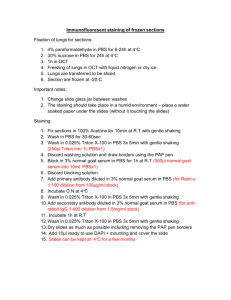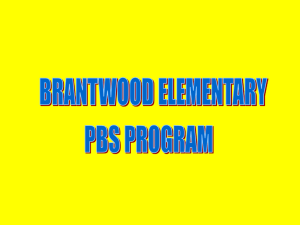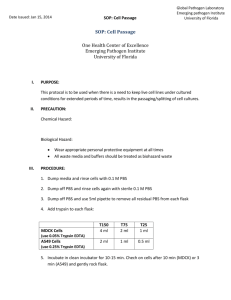PBS and Families - LiteracyAccess Online
advertisement
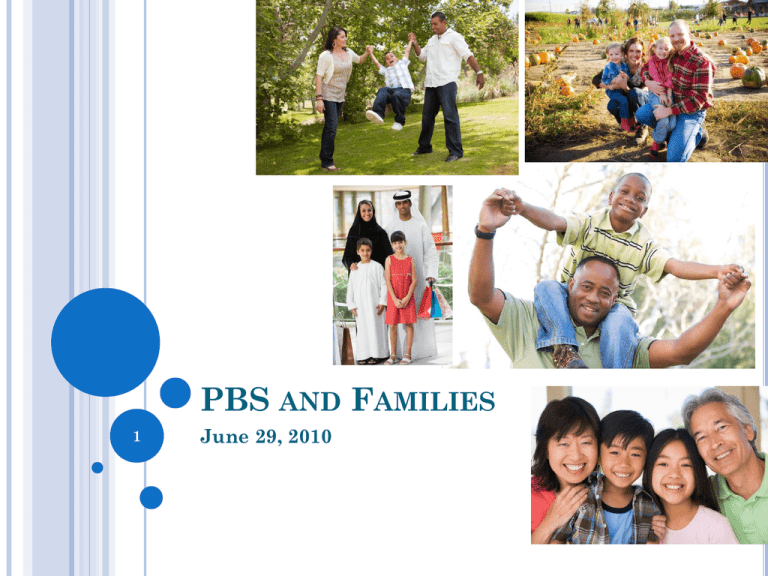
PBS AND FAMILIES 1 June 29, 2010 Ms. Amy Parmentier, LCSW School Social Worker Fairfax County Public Schools Ms. Mandy Freeman, Ed.S. PBIS Curriculum Resource Teacher Fairfax County Public Schools 2 AGENDA Parental Involvement: Importance and Benefits Research on PBS and Families: Current Research FCPS Data Five Steps to Include Families Measuring Participation 3 THE PBS ELEMENTS OUTCOMES FAMILY SCHOOL COMMUNITY 4 SCHOOL-FAMILY-COMMUNITY PARTNERSHIPS: TYPES OF PRACTICES •Parenting •Communicating •Volunteering •Learning at Home •Decision Making •Collaborating with the Community -Epstein, 1995 5 WHY IS PARENTAL INVOLVEMENT IMPORTANT? “No matter what the demographics, students are more likely to earn higher grades and test scores, attend school regularly, have better social skills, graduate and go on to postsecondary education when schools and families partner.” - Karen Mapp, Family Involvement Equals Student Success No Matter Background, August 10, 2006. 6 BENEFITS OF FAMILY INVOLVEMENT Higher test scores Better grades Better attendance Higher levels of homework completion More positive student motivation Improved attitudes about school work -Darsch, Miao, & Shippen. (2004) A Model for Involving Parents of Children with Learning and Behavior Problems in the Schools: Preventing School Failure 48(3), 24-35 7 RESEARCH: PBS & FAMILIES Timothy J. Lewis, University of Missouri-Columbia Extension of school-wide logic to include families 8 PBS PARENTAL INVOLVEMENT SURVEY RESULTS: JANUARY 2010 75% respondents indicated that there was a fully or partially implemented process for informing parents about the school’s PBS framework and practices Almost 30% of respondents reported at least one parent is on the PBS committee. Almost 70% of respondents indicated that the team is either in the planning stages for representation or a parent is not yet a member of the PBS committee Nearly 80% of respondents reported that they collaborate with parents to support positive behavior and address behaviors of concern. 9 10 11 Dolphin Code of Conduct Check-in/Check-out Program Check-in/Check-out is part of Stratford Landing’s Positive Behavior Support Program. It is a way to recognize and encourage positive behavior in individual students. The student and teacher select specific goals based on student need. Students meet with the school counselor on a daily basis to review the goals for the day. Throughout the day, the teacher and student will determine if the the goals have been met. At the end of the day, the counselor and student meet again to assess the day. A copy of the Check-in/Check-out Report goes home with the student each night for parent review and signature. The report should be brought back the next day. Respect Thank you for your support of the Checkin/Check-out Program and Positive Behavior Support at Stratford Landing. Care for yourself and others Keep trying everyday Responsible Be honest Follow directions Ready Be prepared Do your best http://www.fcps.edu/mediapub/cabletv/archive/0910/ss0910.htm 13 14 STEPS FOR INCLUDING FAMILIES -LEWIS, 2009 Teams focus on outcomes 1. Develop working definition of family participation relative to data Strive for accessibility sensitive to the culture of the school community School-wide systems and family participation function independently 15 STEPS FOR INCLUDING FAMILIES 2. Define participation across the continuum • Awareness • Involvement • Support 16 SAMPLE FAMILY AND EDUCATOR PARTICIPATION TIER 1 OUTCOMES Awareness Involvement Support Family Outcome Can identify school expectations and continuum of practices Increase in family presence at school functions Aware of withinschool supports and related community agencies Educator Outcome Make frequent connections to families to discuss primary practices Make connections with families during schoolbased functions Available to answer family questions/concerns about primary practices -adapted from Lewis, 2009 17 STEPS FOR INCLUDING FAMILIES 3. Identify and implement strategies for family engagement Awareness Involvement Support 18 19 ROADBLOCKS & BRIDGES 20 STEPS FOR INCLUDING FAMILIES 4. Acknowledge incremental increases toward meeting goals • Create an action plan with a parent component • Celebrate! 21 STEPS FOR INCLUDING FAMILIES 5. Teams follow the same problem-solving logic for gathering and using data 22 DEFINING AND MEASURING PARTICIPATION Example: Definitions: Measurement: Parental involvement at school events •Volunteer Log •Sign in sheets Parental assistance with homework •Assignment Notebook signatures/comments/dialogue between parent and teacher 23 CREATE YOUR OWN PATH! 24 Awareness Involvement Support Family Outcomes Educator Outcomes Strategies to support outcomes 25
